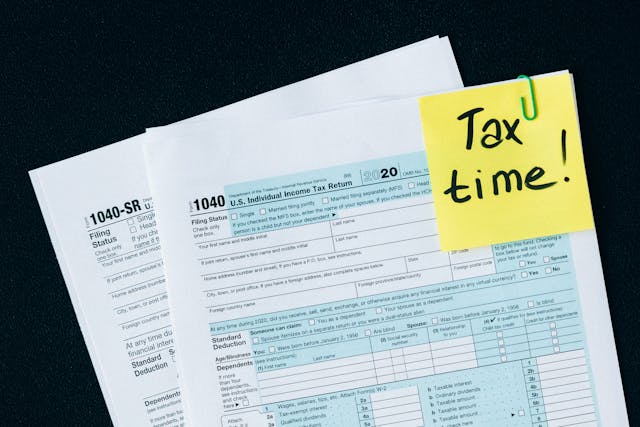
- Maximize Deductions: Take advantage of common deductions like mortgage interest, repairs, and professional services to reduce taxable income.
- Keep Accurate Records: Track all rental income and expenses, and consider using accounting software or hiring a professional to streamline your finances.
- Understand Depreciation: Properly calculate and track depreciation for your rental property to maximize your tax benefits.
- Consider Professional Help: Partnering with a property management company like Lone Eagle Management can ensure accurate financial reporting and help maximize deductions.
Tax season can be stressful for landlords, especially for those managing multiple rental properties. Understanding tax obligations, maximizing deductions, and keeping accurate financial records are essential to minimizing tax liabilities and ensuring compliance.
We’ve created this guide at Lone Eagle Management to provide comprehensive tax tips to help landlords be more confident during tax season and optimize their rental business.
Learn How We Can Help You Maximize Your Home’s Potential!
Understanding Rental Income
Rental income includes any payment received for the use of a property. According to the Internal Revenue Service (IRS), this encompasses monthly rent payments, advance rent, lease cancellation fees, tenant-paid expenses, and even barter arrangements where services or property are exchanged instead of cash.
Keeping accurate records of all rental income ensures proper tax reporting and prevents potential issues with the IRS.
Common Tax Deductions for Landlords
Landlords can significantly reduce their taxable income by taking advantage of allowable deductions. Some of the most common deductions include:
- Mortgage Interest: Interest on loans used to acquire or improve rental properties is deductible. Since mortgage interest is often one of the largest expenses, this deduction can provide substantial tax relief.
- Repairs and Maintenance: Ordinary and necessary maintenance and repairs such as fixing leaks, repainting walls, and replacing broken appliances are deductible in the year the expense is incurred.
- Depreciation: The IRS allows landlords to recover the cost of residential rental property through depreciation over 27.5 years. This non-cash deduction helps offset taxable income each year.
- Insurance Premiums: Expenses related to property insurance, including landlord liability and fire insurance, can be deducted.

- Utilities: If a landlord pays for electricity, water, or other utilities on behalf of tenants, these expenses qualify as deductions.
- Professional Services: Fees paid to accountants, property managers, and attorneys for rental-related activities are deductible.
- Advertising Costs: Expenses related to marketing the rental property, such as online listings or print advertisements, can be deducted as operating expenses.
- Travel Expenses: Costs related to travel for rental business purposes, such as visiting properties for inspections, maintenance, or meetings, can be deducted. This includes mileage for local travel and airfare or lodging for long-distance property management.
Maintaining Accurate Financial Records
Maintaining proper financial records is crucial for tax preparation. Landlords should keep receipts, invoices, bank statements, and financial reports related to rental activities. Using accounting software or working with a professional can streamline record-keeping.
Most landlords use the cash basis method, where income is reported when received and expenses are deducted when paid, while the accrual method reports income and expenses when earned or incurred, regardless of payment status.
Repairs vs. Improvements
The IRS distinguishes between repairs and improvements, which can impact tax deductions:
Repairs: Costs that restore a rental property to its original condition, such as fixing a broken pipe or repainting walls, are deductible in the year they occur.
Improvements: Upgrades or renovations that increase a property's value or extend its lifespan, such as adding a new roof or installing energy-efficient windows, must be depreciated over time instead of being deducted in full.
Landlords should carefully track these expenses to ensure they categorize them correctly for tax purposes.

Home Office Deduction
Landlords who use part of their home exclusively for managing rental properties may qualify for the home office deduction. This deduction allows them to write off a portion of expenses such as rent, utilities, and internet costs.
However, to qualify, the space must be used regularly and exclusively for rental management tasks like bookkeeping, tenant communication, and property marketing.
Handling Security Deposits and Advance Rent
Security deposits generally do not count as taxable income if they are refundable. However, if a landlord keeps all or part of a security deposit to cover repairs or unpaid rent, that amount becomes taxable in the year it is retained.
Advance rent, on the other hand, is always considered taxable in the year it is received, regardless of the lease term.
Tracking Depreciation Properly
Depreciation is one of the most valuable tax benefits for landlords, allowing them to spread out the cost of property purchases over time. To calculate depreciation:
- Determine the property's basis, which includes the purchase price plus any acquisition costs.
- Identify the depreciable amount, which excludes the value of the land.
- Use the Modified Accelerated Cost Recovery System (MACRS) to determine annual depreciation deductions.
Since depreciation rules can be complex, consulting with a tax professional can help landlords maximize this benefit.
State and Local Tax Considerations
Tax rules vary by state, and landlords should familiarize themselves with local property tax laws, sales taxes (if applicable), and any additional filing requirements. Some states impose additional taxes on rental income, while others offer tax incentives for landlords who provide affordable housing.

The Importance of Estimated Tax Payments
Since rental income is not subject to automatic tax withholding, landlords may need to make estimated tax payments quarterly.
If rental profits exceed certain thresholds, the IRS requires landlords to pay estimated taxes four times a year (April, June, September, and January). Failure to do so may result in penalties and interest charges.
Partnering with a Professional Property Management Company
Handling rental property finances can be overwhelming, especially for landlords with multiple properties. Partnering with a professional property management company can provide significant tax-related benefits:
- Accurate Financial Reporting: Property managers provide detailed financial statements that simplify tax preparation and help landlords track deductible expenses.
- Expense Tracking and Documentation: A property management company ensures all maintenance, repair, and operational expenses are documented properly, reducing the risk of IRS audits.
- Compliance with Local Laws: Property managers stay up to date with tax regulations, ensuring landlords have all the documents to meet reporting and filing deadlines.
- Streamlined Rent Collection: Consistent and documented rent collection helps prevent discrepancies in income reporting.
- Maximized Tax Deductions: Property managers help landlords identify all allowable deductions, ensuring they take full advantage of tax benefits.
Bottom Line
Tax season can be complicated for landlords, but proper planning and organization can make it much easier. By following the above tips, landlords can reduce their tax burden and increase profitability.
Working with a professional property management company offers additional support, from financial reporting to expense tracking, making tax season smoother and more efficient.
Staying informed about tax strategies ensures landlords remain compliant and financially successful in the rental business. Looking to partner with an experienced and trustworthy property management company? Look no further than the experts at Lone Eagle Management!